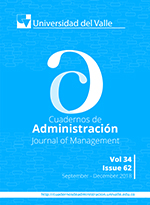Incidence of Stakeholders in the corporate social responsibility of micro, small and medium-sized enterprises of Santa Marta
Main Article Content
This article analyses the perception and application of corporate social responsibility (CSR) practices in a sample of 499 micro, small and medium enterprises (MSMEs) in the city of Santa Marta (Colombia) following the theory of Stakeholders. Specifically, the interdependence technique of exploratory factor analysis was used to determine the most influential Stakeholders in the execution of CSR practices. It was found that Stakeholders related to the value chain, the environment and corporate management favour social responsibility actions in local MSMEs. In contrast, community and government have less influence on the development of social responsibility practices in MSMEs. Additionally, it was found that the size of the business acts as an important moderator of the development of the CSR. Given that there is a distinctive influence of Stakeholders in the development of responsible practices in the MSMEs of Santa Marta, it is suggested that comprehensive training programs on social responsibility be promoted in smaller companies.
Downloads

This work is licensed under a Creative Commons Attribution-NonCommercial-NoDerivatives 4.0 International License.

